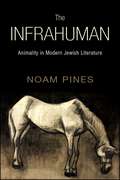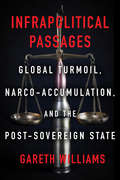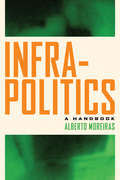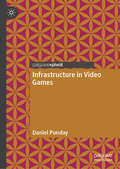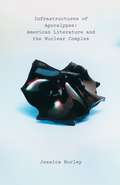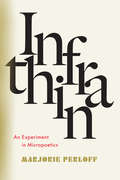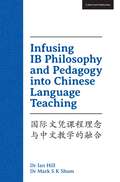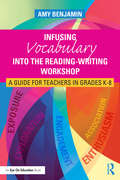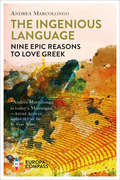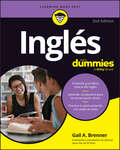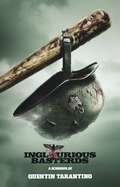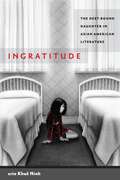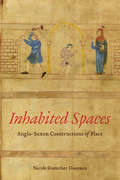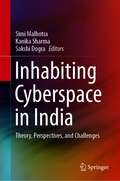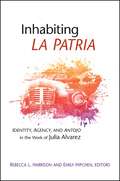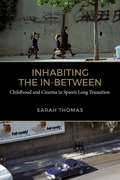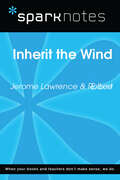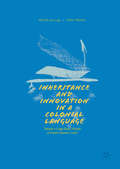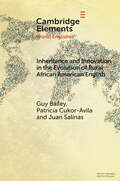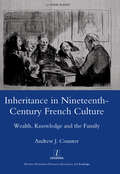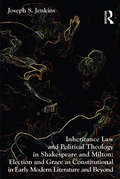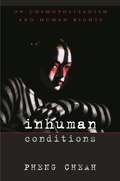- Table View
- List View
The Infrahuman: Animality in Modern Jewish Literature (SUNY series in Contemporary Jewish Literature and Culture)
by Noam PinesThe Infrahuman explores a little-known aspect in major works of Jewish literature from the period preceding World War II, in which Jewish writers in German, Hebrew, and Yiddish employed figures of animals in pejorative depictions of Jews and Jewish identity. Such depictions are disturbing because they sometimes rival common anti-Semitic stereotypes, and have often been explained away as symptoms of Jewish self-hatred. In this book, Noam Pines shows how animality emerged in Jewish literature not as a biological or conceptual category, but as a theological figure of exclusion from a state of humanity and Christianity alike. By framing the human-animal question in theological terms rather than in racial-biological terms, writers such as Heinrich Heine, S. Y. Abramovitsh, Hayim Nachman Bialik, Uri Zvi Greenberg, Franz Kafka, S. Y. Agnon, and Paul Celan subjected the pejorative designations of Jewish identity to literary elaboration and to philosophical negotiation.
Infrapolitical Passages: Global Turmoil, Narco-Accumulation, and the Post-Sovereign State
by Gareth WilliamsThis book makes a case for infrapolitics as an enactment of intellectual responsibility in the face of a tumultuous world of war and of technological value extraction on a planetary scale. Infrapolitical Passages proposes to clear a way through some of the dominant political determinations and violent symptoms of contemporary globalization. In doing so, Gareth Williams makes a case for infrapolitics as an enactment of intellectual responsibility in the face of a tumultuous world of war and of technological value extraction on a planetary scale. The book offers a theory of globalization as a gigantic, directionless crisis in humanity’s symbolic organization, as well as a theory of global economic warfare as the very positing of directionlessness and, at the same time, facticity. Williams’s infrapolitics stands at a distance from the biopolitical, which it understands as domination presenting itself as the production of specific forms of subjectivity in the face of the commodity. The subsequent obscuring of being signals the need to circumvent the instrumentalization of life as subordination to the metaphysics of subjectivity, representation, and politics. Infrapolitical Passages works to confront that which is unavailable in subjectivity and representation, opening a way for facticity in the age of globalization in order to make room for the infrapolitical question for existence.
Infrapolitics: A Handbook
by Alberto MoreirasThe personal is not political, even if politics marks it and, in many cases, determines it. Infrapolitics seeks to understand conditions of existence that are not reducible to political life and that exceed any definition of world bound to political determinations. It seeks to mobilize an exteriority without which politics could only be business or administration, that is, oppression. It demands a change in seeing and an everyday practice that subtracts from political totalization in the name of a new production of desire, of a new emancipation, and of a conception of experience that can breach the general captivation of life.In this book, Alberto Moreiras describes a form of thought aiming to provide content for a form of life and to offer a new theoretical practice for concrete existence. The book provides a genealogy of the notion of infrapolitics and places it within contemporary philosophical reflection, examining its deployment in the wake of postphenomenology and deconstruction, Lacanian analysis, the principle of anarchy, and an egalitarian symbolization of social life. In doing so, Moreiras elaborates Infrapolitics as both a general critique of the political apparatus and as an imperative horizon for existential self-understanding.
Infrastructure in Video Games
by Daniel PundayThis book will sketch the dynamics of infrastructure in video games, focusing on the relationship between game rules, fictional world, and player interaction. It will discuss a variety of commercial video games, both mainstream and somewhat niche, that use infrastructure in different ways: Control, Wolfenstein, Fallout, This War of Mine, Exocolonist, Cyberpunk, and Frostpunk. Video games offer a particularly rich field for thinking about the relationship between narrative and infrastructure. The infrastructures that exist in the fictional worlds of these games define the experience of play in a very direct way: how players are instantiated in the game, how they move around the play space, the resources that are available, and so on. And those infrastructures in turn very directly definite the nature of the fictional world. In contrast to literary fiction, were infrastructures might remain on the periphery of some stories, by virtue of the centrality of player interaction video games are inherently infrastructural.
Infrastructures of Apocalypse: American Literature and the Nuclear Complex
by Jessica HurleyA new approach to the vast nuclear infrastructure and the apocalypses it produces, focusing on Black, queer, Indigenous, and Asian American literatures Since 1945, America has spent more resources on nuclear technology than any other national project. Although it requires a massive infrastructure that touches society on myriad levels, nuclear technology has typically been discussed in a limited, top-down fashion that clusters around powerful men. In Infrastructures of Apocalypse, Jessica Hurley turns this conventional wisdom on its head, offering a new approach that focuses on neglected authors and Black, queer, Indigenous, and Asian American perspectives. Exchanging the usual white, male &“nuclear canon&” for authors that include James Baldwin, Leslie Marmon Silko, and Ruth Ozeki, Infrastructures of Apocalypse delivers a fresh literary history of post-1945 America that focuses on apocalypse from below. Here Hurley critiques the racialized urban spaces of civil defense and reads nuclear waste as a colonial weapon. Uniting these diverse lines of inquiry is Hurley&’s belief that apocalyptic thinking is not the opposite of engagement but rather a productive way of imagining radically new forms of engagement.Infrastructures of Apocalypse offers futurelessness as a place from which we can construct a livable world. It fills a blind spot in scholarship on American literature of the nuclear age, while also offering provocative, surprising new readings of such well-known works as Atlas Shrugged, Infinite Jest, and Angels in America. Infrastructures of Apocalypse is a revelation for readers interested in nuclear issues, decolonial literature, speculative fiction, and American studies.
Infrathin: An Experiment in Micropoetics
by Marjorie PerloffEsteemed literary critic Marjorie Perloff reconsiders the nature of the poetic, examining its visual, grammatical, and sound components. The “infrathin” was Marcel Duchamp’s playful name for the most minute shade of difference: that between the report of a gunshot and the appearance of the bullet hole, or between two objects in a series made from the same mold. “Eat” is not the same thing as “ate.” The poetic, Marjorie Perloff suggests, can best be understood as the language of infrathin. For in poetry, whether in verse or prose, words and phrases that are seemingly unrelated in ordinary discourse are realigned by means of sound, visual layout, etymology, grammar, and construction so as to “make it new.” In her revisionist “micropoetics,” Perloff draws primarily on major modernist poets from Stein and Yeats to Beckett, suggesting that the usual emphasis on what this or that poem is “about,” does not do justice to its infrathin possibilities. From Goethe’s eight-line “Wanderer’s Night Song” to Eliot’s Four Quartets, to the minimalist lyric of Rae Armantrout, Infrathin is designed to challenge our current habits of reading and to answer the central question: what is it that makes poetry poetry?
Infusing IB Philosophy and Pedagogy into Chinese Language Teaching
by Mark S. ShumThis book not only examines what IB philosophy is, it also explores the relationship between IB philosophy and Chinese language and culture and introduces a lot of useful and creative teaching pedagogies and methodologies. Most importantly, this book fills the gap of implementing IB philosophy and pedagogy into Chinese language teaching.
Infusing IB Philosophy and Pedagogy into Chinese Language Teaching
by Mark S. ShumThis book not only examines what IB philosophy is, it also explores the relationship between IB philosophy and Chinese language and culture and introduces a lot of useful and creative teaching pedagogies and methodologies. Most importantly, this book fills the gap of implementing IB philosophy and pedagogy into Chinese language teaching.
Infusing Vocabulary Into the Reading-Writing Workshop: A Guide for Teachers in Grades K-8
by Amy BenjaminLearn how to make vocabulary instruction more effective by making better use of mini-lessons and word study time to achieve durable learning about words and how they work. In this essential new book, literacy expert Amy Benjamin presents her 4E model (Exposure, Exploration, Engagement, Energy) for teaching vocabulary so that students gain deep understanding, improving their overall language and literacy skills. Benjamin guides you through bringing these 4Es to life in your K-8 reading-writing workshop. -Exposure: Enrich your teacher talk with sophisticated words and phrases to facilitate natural language acquisition and application of new words. -Exploration: Promote consistent vocabulary growth with a multifaceted instructional approach that incorporates etymology, word associations, word families, spelling, and morphology. -Engagement: Build students’ confidence by encouraging meaningful use of new words, both in and out of the classroom. -Energy: Enliven your workshop and increase participation with a variety of word games, puzzles, projects, and cooperative learning activities. Each chapter provides practical examples and scenarios to help you apply the model to your own classroom. The appendices include a variety of strategies for organizing reading-writing workshops, a thorough introduction to academic word lists and their role in vocabulary instruction, and an analysis of forty Latin and Greek word roots for mini-lessons.
The Ingenious Language: Nine Epic Reasons to Love Greek
by Andrea MarcolongoAn Italian journalist pleads her case for learning ancient Greek in modern times. For word nerds, language loons, and grammar geeks, an impassioned and informative literary leap into the wonders of the Greek language. Here are nine ways Greek can transform your relationship to time and to those around you, nine reflections on the language of Sappho, Plato, and Thucydides, and its relevance to our lives today, nine chapters that will leave readers with a new passion for a very old language, nine epic reasons to love Greek.The Ingenious Language is a love song dedicated to the language of history&’s greatest poets, philosophers, adventurers, lovers, adulterers, and generals. Greek, as Marcolongo explains in her buoyant and entertaining prose, is unsurpassed in its beauty and expressivity, but it can also offer us new ways of seeing the world and our place in it. She takes readers on an astonishing journey, at the end of which, while it may still be Greek to you, you&’ll have nine reasons to be glad it is. No batteries or prior knowledge of Greek required!Praise for The Ingenious Language&“Andrea Marcolongo is today&’s Montaigne. She possesses an amazing familiarity with the classics combined with the ease and lightness of those who surf the web.&” —André Aciman, New York Times–bestselling author of Find Me&“[Marcolongo&’s] declaration of love for Ancient Greek does more than celebrate the virtues of its grammar, it shows us modern fools how this language can help us understand ourselves better and live a better life.&” —Le Monde (France)
Inglés Para Dummies
by Gail BrennerEs fácil aprender inglés, lo prometemos Ingles Para Dummies está repleto de explicaciones claras de la gramática, el uso, la jerga y más en inglés, todo en un formato fácil de seguir. Estudia a su propio ritmo, en la comodidad de su hogar, con esta guía imprescindible para cualquier persona que quiera aprender inglés. Le encantará el útil mini diccionario inglés-español mientras aprende la jerga para saludos personales, conversaciones telefónicas, compras, viajes, cenas y otras actividades diarias. Además, los ejemplos del mundo real te permiten poner en práctica sus nuevas habilidades. Con ayuda de pronunciación, consejos y trucos, y errores comunes para evitar, Ingles Para Dummies tiene todo lo que necesitas para usar el inglés con confianza. Aprende la gramática básica del inglés y las expresiones importantes del día a día Practica tu pronunciación y evita errores comunes Domina frases útiles para el hogar, el trabajo, la salud y la recreación Usa atajos prácticos y jerga auténtica para una conversación fácil y divertidaLos hispanohablantes que recién comienzan con el inglés pueden aprender rápida y fácilmente vocabulario básico, gramática y habilidades de conversación, además de mejorar la confianza para hablar y manejar situaciones cotidianas, gracias a este divertido libro Dummies.
Inglourious Basterds: A Screenplay
by Quentin TarantinoFrom the most original and beloved screenwriter of his generation, the complete Oscar-nominated screenplay of Quentin Tarantino's World War II epic Inglorious Basterds. From the brilliant writer/director behind the iconic films Pulp Fiction, Kill Bill, and Once Upon a Time in Hollywood, comes Tarantino's most ambitious movie: a World War II epic starring Brad Pitt and filmed on location in Germany and France. The action tale follows the parallel story of a guerrilla-like squad of American soldiers called "The Basterds" and the French Jewish teenage girl Shosanna who find themselves behind enemy Nazi lines during the German occupation. When the Inglourious Basterds encounter Shosanna at a propaganda screening at the movie house she runs, they conspire to launch an unexpected plot to end the war. Pitt plays Lieutenant Aldo Raine -- the leader of the Basterds. Raine is an illiterate hillbilly from the mountains of Tennessee who puts together a team of eight Jewish-American soldiers to hunt down the Nazis. Filled with Tarantino's trademark electric dialogue and thrilling action sequences, Inglourious Basterds is one of the most celebrated films of the twenty-first century.
Ingratitude: The Debt-Bound Daughter in Asian American Literature
by erin Khuê Ninh2013 Winner of the Asian American Studies Association's prize in Literary Studies Anger and bitterness tend to pervade narratives written by second generation Asian American daughters, despite their largely unremarkable upbringings. In Ingratitude, erin Khuê Ninh explores this apparent paradox, locating in the origins of these women’s maddeningly immaterial suffering not only racial hegemonies but also the structure of the immigrant family itself. She argues that the filial debt of these women both demands and defies repayment—all the better to produce the docile subjects of a model minority.Through readings of Jade Snow Wong’s Fifth Chinese Daughter, Maxine Hong Kingston’s The Woman Warrior, Evelyn Lau’s Runaway: Diary of a Street Kid, Catherine Liu’s Oriental Girls Desire Romance, and other texts, Ninh offers not an empirical study of intergenerational conflict so much as an explication of the subjection and psyche of the Asian American daughter. She connects common literary tropes to their theoretical underpinnings in power, profit, and subjection. In so doing, literary criticism crosses over into a kind of collective memoir of the Asian immigrants’ daughter as an analysis not of the daughter, but for and by her.
Inhabited Spaces: Anglo-Saxon Constructions of Place
by Nicole DiscenzaWe tend to think of early medieval people as unsophisticated about geography because their understandings of space and place often differed from ours, yet theirs were no less complex. Anglo-Saxons conceived of themselves as living at the centre of a cosmos that combined order and plenitude, two principles in a constant state of tension. In Inhabited Spaces, Nicole Guenther Discenza examines a variety of Anglo-Latin and Old English texts to shed light on Anglo-Saxon understandings of space. Anglo-Saxon models of the universe featured a spherical earth at the centre of a spherical universe ordered by God. They sought to shape the universe into knowable places, from where the earth stood in the cosmos, to the kingdoms of different peoples, and to the intimacy of the hall. Discenza argues that Anglo-Saxon works both construct orderly place and illuminate the limits of human spatial control.
Inhabiting Cyberspace in India: Theory, Perspectives, and Challenges
by Simi Malhotra Kanika Sharma Sakshi DograThis book gathers a selection of essays on the multifaceted aspects of cyber culture in India, both online and offline. It presents an in-depth analysis of cyberspace and its components, while also exploring its lived reality. The respective contributions highlight theoretical perspectives that address questions of relationality regarding all aspects of cyber culture in India, from the physical to the virtual. Bearing in mind India’s vast cultural diversity, which is shaped by different levels of political, social, and economic development, the book offers nuanced studies that analyze the complexities of cyberspace and digital culture in India. The book appeals to all readers interested in technology, cultural studies, online communication networks, feminism, virtual diasporas, and sociology.
Inhabiting La Patria: Identity, Agency, and Antojo in the Work of Julia Alvarez (SUNY series in Multiethnic Literatures)
by Rebecca L. Harrison and Emily HipchenThis is the first collection of critical essays on the works of Dominican American author Julia Alvarez. A prolific writer of nearly two dozen books of poetry, fiction, nonfiction, and children's literature, Alvarez has garnered numerous international accolades, including the impressive F. Scott Fitzgerald Award for Outstanding Achievement in American Literature. She was one of only ten poets invited to write for President Obama's inauguration in 2009, and her In the Time of the Butterflies was selected as a National Endowment for the Arts "Big Read," putting her in the company of Mark Twain, Zora Neale Hurston, and Harper Lee. Yet, despite Alvarez's commercial success and flourishing critical reputation, much of the published scholarship has focused on her two best-known novels—In the Time of the Butterflies and How the García Girls Lost Their Accents.Moving beyond Alvarez's more recognizable work, the contributors here approach her wider canon from different points of access and with diverging critical tools. This enriches current discussions on the construction of selves in life writing, and nonfiction more generally, and furthers our understanding of these selves as particular kinds of participants in the creation of nation and place. In addition, this book provides fresh insight for transnational feminist studies and makes a meaningful contribution to the broader study of the gendered diaspora, as it positions Alvarez scholarship in a global context.
Inhabiting the In-Between: Childhood and Cinema in Spain’s Long Transition (Toronto Iberic)
by Sarah ThomasAlthough children have proliferated in Spain’s cinema since its inception, nowhere are they privileged and complicated in quite the same way as in the films of the 1970s and early 1980s, a period of radical political and cultural change for the nation as it emerged from almost four decades of repressive dictatorship under the rule of General Francisco Franco. In Inhabiting the In-Between: Childhood and Cinema in Spain’s Long Transition, Sarah Thomas analyzes the cinematic child within this complex historical conjuncture of a nation looking back on decades of authoritarian rule and forward to an uncertain future. Examining films from several genres by four key directors of the Transition – Carlos Saura, Antonio Mercero, Víctor Erice, and Jaime de Armiñán – Inhabiting the In-Between explores how the child is represented as both subject and object, self and other, and consistently cast in a position between categories or binary poles. Its readings demonstrate how the cinematic child that materializes in this period is a fundamentally shifting, oscillating, ambivalent figure that points toward the impossibility of fully comprehending the historical past and the figure of the other, while inviting an ethical engagement with each.
Inherit the Wind (SparkNotes Literature Guide Series)
by SparkNotesInherit the Wind (SparkNotes Literature Guide) by Jerome Lawrence Making the reading experience fun! Created by Harvard students for students everywhere, SparkNotes is a new breed of study guide: smarter, better, faster. Geared to what today's students need to know, SparkNotes provides: *Chapter-by-chapter analysis *Explanations of key themes, motifs, and symbols *A review quiz and essay topicsLively and accessible, these guides are perfect for late-night studying and writing papers
Inheritance and Innovation in a Colonial Language
by William Jennings Stefan PfänderThis book takes a fresh approach to analysing how new languages are created, combining in-depth colonial history and empirical, usage-based linguistics. Focusing on a rarely studied language, the authors employ this dual methodology to reconstruct how multilingual individuals drew on their perception of Romance and West African languages to form French Guianese Creole. In doing so, they facilitate the application of a usage-based approach to language while simultaneously contributing significantly to the debate on creole origins. This innovative volume is sure to appeal to students and scholars of language history, creolisation and languages in contact. Chapter 3 is published open access under a CC BY 4. 0 license.
Inheritance and Innovation in the Evolution of Rural African American English (Elements in World Englishes)
by Guy Bailey Patricia Cukor-Avila Juan SalinasThis Element uses data from the Springville Project to explore how the functions of the inherited forms invariant be (from English sources) and zero (from creolization) have transformed during the twentieth century. Originally just alternative present tense copula/auxiliary forms, both features developed into aspectual markers – invariant be to mark durativity/habituality and zero to mark nonstativity. The motivation for these innovations were both socio-cultural and linguistic. The Great Migration and its consequences provided a demographic and socio-cultural context within which linguistic innovations could develop and spread. The mismatch between form and function within the present tense copula/auxiliary system and the grammatical ambiguities that affected both invariant be and zero provided linguistic triggers for this reanalysis. When taken together, the evolution of these forms illustrates how restructured linguistic subsystems (and eventually new varieties) emerge out of the interplay between inheritance and innovation.
Inheritance in Nineteenth-century French Culture: Wealth, Knowledge and the Family
by AndrewJ. CounterThe transmission of wealth between generations was not only a narrative commonplace in nineteenth-century France, but also a topic of considerable cultural anxiety and intense political debate. In this study, Andrew J. Counter draws on a wealth of previously unexplored material to show how the theme of inheritance in literature and beyond acquired ethical, historical and ideological connotations, and was vital to nineteenth-century French conceptions of the family and of the legacy of the Revolution. Weaving together fiction, drama, legal texts, historiographical thought and political writing, Inheritance in Nineteenth-Century French Culture teases out a complex leitmotiv that gives us a new understanding of nineteenth- century Frances sense of its own place in history. It also proposes innovative readings of writers as familiar as Honore de Balzac, George Sand, Guy de Maupassant and Emile Zola, while drawing attention to a range of neglected authors and works.
Inheritance Law and Political Theology in Shakespeare and Milton: Election and Grace as Constitutional in Early Modern Literature and Beyond
by Joseph S. JenkinsReading God's will and a man's Last Will as ideas that reinforce one another, this study shows the relevance of England's early modern crisis, regarding faith in the will of God, to current debates by legal academics on the theory of property and its succession. The increasing power of the dead under law in the US, the UK, and beyond-a concern of recent volumes in law and social sciences-is here addressed through a distinctive approach based on law and humanities. Vividly treating literary and biblical battles of will, the book suggests approaches to legal constitution informed by these dramas and by English legal history. This study investigates correlations between the will of God in Judeo-Christian traditions and the Last Wills of humans, especially dominant males, in cultures where these traditions have developed. It is interdisciplinary, in the sense that it engages with the limits of several fields: it is informed by humanities critical theory, especially Benjaminian historical materialism and Lacanian psychoanalysis, but refrains from detailed theoretical considerations. Dramatic narratives from the Bible, Shakespeare, and Milton are read as suggesting real possibilities for alternative inheritance (i.e., constitutional) regimes. As Jenkins shows, these texts propose ways to alleviate violence, violence both personal and political, through attention to inheritance law.
Inheriting a Canoe Paddle
by Misao DeanIf the canoe is a symbol of Canada, what kind of Canada does it symbolize? Inheriting a Canoe Paddle looks at how the canoe has come to symbolize love of Canada for non-aboriginal Canadians and provides a critique of this identification's unintended consequences for First Nations. Written with an engaging, personal style, it is both a scholarly examination and a personal reflection, delving into representations of canoes and canoeing in museum displays, historical re-enactments, travel narratives, the history of wilderness expeditions, artwork, film, and popular literature.Misao Dean opens the book with the story of inheriting her father's canoe paddle and goes on to explore the canoe paddle as a national symbol - integral to historical tales of exploration and trade, central to Pierre Trudeau's patriotism, and unique to Canadians wanting to distance themselves from British and American national myths. Throughout, Inheriting a Canoe Paddle emphasizes the importance of self-consciously evaluating the meaning we give to canoes as objects and to canoeing as an activity.
Inhuman Citizenship: Traumatic Enjoyment and Asian American Literature
by Juliana ChangIn Inhuman Citizenship, Juliana Chang claims that literary representations of Asian American domesticity may be understood as symptoms of America&’s relationship to its national fantasies and to the &“jouissance&”—a Lacanian term signifying a violent yet euphoric shattering of the self—that both overhangs and underlies those fantasies. In the national imaginary, according to Chang, racial subjects are often perceived as the source of jouissance, which they supposedly embody through their excesses of violence, sexuality, anger, and ecstasy—excesses that threaten to overwhelm the social order.To examine her argument that racism ascribes too much, rather than a lack of, humanity, Chang analyzes domestic accounts by Asian American writers, including Fae Myenne Ng&’s Bone, Brian Ascalon Roley&’s American Son, Chang-rae Lee&’s Native Speaker, and Suki Kim&’s The Interpreter. Employing careful reading and Lacanian psychoanalysis, Chang finds sites of excess and shock: they are not just narratives of trauma; they produce trauma as well. They render Asian Americans as not only the objects but also the vehicles and agents of inhuman suffering. And, claims Chang, these novels disturb yet strangely exhilarate the reader through characters who are objects of racism and yet inhumanly enjoy their suffering and the suffering of others.Through a detailed investigation of &“family business&” in works of Asian American life, Chang shows that by identifying with the nation&’s psychic disturbance, Asian American characters ethically assume responsibility for a national unconscious that is all too often disclaimed.
Inhuman Conditions: On Cosmopolitanism and Human Rights
by Pheng CheahGlobalization promises to bring people around the world together, to unite them as members of the human community. To such sanguine expectations, Pheng Cheah responds deftly with a sobering account of how the "inhuman" imperatives of capitalism and technology are transforming our understanding of humanity and its prerogatives. Through an examination of debates about cosmopolitanism and human rights, Inhuman Conditions questions key ideas about what it means to be human that underwrite our understanding of globalization. Cheah asks whether the contemporary international division of labor so irreparably compromises and mars global solidarities and our sense of human belonging that we must radically rethink cherished ideas about humankind as the bearer of dignity and freedom or culture as a power of transcendence. Cheah links influential arguments about the new cosmopolitanism drawn from the humanities, the social sciences, and cultural studies to a perceptive examination of the older cosmopolitanism of Kant and Marx, and juxtaposes them with proliferating formations of collective culture to reveal the flaws in claims about the imminent decline of the nation-state and the obsolescence of popular nationalism. Cheah also proposes a radical rethinking of the normative force of human rights in light of how Asian values challenge human rights universalism.
